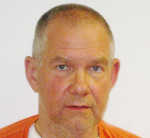Sentence modification for Howell under advisement

Just a day short of one year since he was sentenced to prison for unlawfully dispensing narcotics to patients -- at times in exchange for sexual favors -- a former Roachdale physician is under consideration for a sentence modification.
A video conference hearing for Ray D. Howell, who on June 21, 2012 pled guilty to five of the 15 felony counts against him, unfolded Monday afternoon in Putnam Circuit Court, essentially without participation from Howell.
His new Indianapolis attorney, Jay Clifford, appeared before Putnam Circuit Court Judge Matthew Headley to request Howell be released early from the New Castle Correctional Facility to receive care in a nursing home-type setting.
The 59-year-old Howell, appearing emaciated and incoherent, was present via a courtroom video monitor. At one time in the proceedings, he could be heard telling the two correctional officers flanking him that he wanted to go back to his room.
Another time Howell stood up from the wheelchair in which he was sitting and appeared oblivious to the proceedings at hand in Greencastle.
Asked if he had anything to say as the court hearing was winding down, Howell responded with a single word. "Nothing," he said.
Attorney Clifford told the court Howell's frontotemporal dementia (FTD) condition "has deteriorated significantly" since his incarceration.
On Aug. 13, 2012, Judge Headley originally ordered Howell to serve four years in the Indiana Department of Correction (DOC) followed by two years suspended and probation.
At the conclusion of a 30-minute hearing Monday afternoon, Judge Headley took the sentence modification request under advisement, saying he would make a ruling within 10 days.
Attorney Clifford framed his support of a sentence modification by noting that incarceration is intended to serve three essential functions: Rehabilitation, punishment and protecting the public.
"None of those are being served by Dr. Howell's continued incarceration," he said.
"He doesn't have any real appreciation at this point of why he's being punished."
In an Aug. 9 letter, behavioral neurologist Dr. Bandy R. Matthews of the Indiana University School of Medicine stated that given the facts regarding FTD, "efforts at rehabilitation in Dr. Howell's situation are futile."
Her letter also notes that Howell's "poor insight renders him unable to recognize the punishment aspect of his incarceration" Likewise, she added, "his profound apathy -- likely the cause of his withdrawal from walking and speaking -- will prevent him from engaging in further unlawful activities."
Clifford also pointed out that he wasn't attempting to have the court reconsider the sentence Howell received. "I think the sentence was fair and appropriate given the circumstances at the time."
Putnam County Prosecutor Timothy Bookwalter, who called no witnesses during the hearing, countered Clifford's remarks with the point that "deterrence and retribution are also part of criminal justice."
Bookwalter stressed also that "nothing has really changed" since Howell's sentencing in August 2012.
"The court had all this information before," he said. "He's gotten worse, but he's in a nursing home situation right now, that's why he's at New Castle (Correctional Facility) being cared for by the Department of Correction.
"We called out there," Bookwalter added, "and they said, 'Yes, he's getting worse,' but they can care for him."
The prosecutor also reminded the court that the state dismissed 10 of the counts filed against Howell, providing him "a very limited sentence."
The court also heard from Mendy Morrison, Howell's oldest daughter, who addressed how far her father has deteriorated since he was initially incarcerated.
His family has "no two-way communication" with him, she said, adding that at some visits he "never acknowledged our presence."
Another time he was able to walk with is family members but stopped intermittently to point to the sky and holler, "Take me up! Take me up!" Morrison said it was as if he were trying to "talk to God."
Frontotemporal dementia is defined as a progressive neurological disorder caused by degeneration of the frontal lobe of the brain, which Howell's previous attorney, Dennis Zahn of Indianapolis, tried to use as part of his defense last summer. However, any alleged effects of the disorder on Howell and his actions did not sway Judge Headley's sentencing decision.
"Your lawyer makes a passionate plea for you, that's for sure," Headley told Howell last August, "but the problem is you placed these people's lives in your hands."
Authorities at that time explained how treatments and prescriptions administered by Howell were linked to sexual encounters with female patients at Tri-County Family Medical Clinic in Roachdale, which Howell operated for more than 20 years.
As part of a plea agreement in June 2012, Howell may never reapply for his medical license or DEA registration "during his natural lifetime."
Also as part of that agreement, Howell pled guilty to:
-- Unlawful distribution of a controlled substance, dispensing Adipex to an Indiana State Police undercover officer.
-- Unlawful dispensation of a controlled substance, Oxycodone, in excessive amounts to a patient.
-- Unlawful dispensation of a controlled substance, Clonazepam, in excessive amounts to a patient, including its use to facilitate sexual encounters.
-- Unlawful dispensation of a controlled substance, Oxycodone, Methadone and/or Alprazolam to a patient in excessive amounts.
-- Furnishing false or fraudulent information or knowingly omitting information from a controlled substance inventory.
The doctor's arrest on Oct. 18, 2011 culminated a more than two-year investigation by local, state and federal authorities that revealed Howell overprescribed or unnecessarily prescribed narcotics that included Oxycodone, Methadone, Adipex, Clonazepam, Lortab, Vicodin, Alprazolam, Xanax, Percocet and Hydrocodone.
